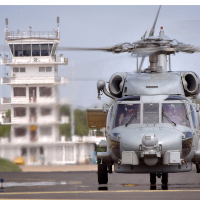Alarming Conditions at U.S. Air Base in Djibouti
 Navy HS-60 Sea Hawk taxis in front of Djibouti Ambouli tower (photo: Scott Wagers, U.S. Air Force)
Navy HS-60 Sea Hawk taxis in front of Djibouti Ambouli tower (photo: Scott Wagers, U.S. Air Force)
And you thought flying into Atlanta was bad.
Pilots and passengers using Djibouti International Airport, site of the only U.S. air base in Africa, take their lives into their hands thanks to a dangerously incompetent air traffic control system there.
Documents obtained by The Washington Post show that the air traffic controllers, civilians who work for the Djibouti government, regularly nap, listen to music, play video games and text on their mobile phones while directing military traffic from several nations, as well as civilian traffic from major world airlines. Many of the controllers are also resentful of the foreign presence in their country.
“Literally, it’s the most dangerous airspace I’ve seen in the world, and I’ve been to Afghanistan,” one Federal Aviation Administration official who spent a year in Djibouti told the Post.
Controllers have been known to force pilots they believe disrespected them to circle the field until they’re dangerously low on fuel. During the day, controllers chew khat, a stimulant that’s banned in the United States. At night, they sleep while pilots call out for landing instructions.
The U.S. base at the airport, Camp Lemonnier, is a joint facility managed by the Navy. The airport also has a French military base and Japanese military aircraft are stationed there and it is an active civilian airport. But the U.S. military accounts for about half the 30,000 aircraft arrivals and departures there each year, including takeoffs and landings of fighters, cargo planes, spy aircraft and even drones used to support missions in the Middle East from the Horn of Africa.
Surprisingly, there has been only one U.S. plane crash near the airport. In 2012, a U-28 single-engine spy plane crashed, killing its four crew members. The Post reported that the plane’s pilot had been denied a request to land and ordered to circle the field.
The Djiboutians particularly dislike drones. At one point, the U.S. military had to move drone operations to a remote strip elsewhere in the country because the controllers would refuse to give them permission to use the runway because they thought them unreliable and blamed the drones for the deaths of fellow Muslims.
The U.S. government has tried to improve the conditions at Djibouti, hiring a consultant to retrain the tower personnel. However, the controllers kept the trainers out of the tower. In another incident, a U.S. Navy officer was threatened by controllers with a pipe.
Whether conditions improve at Djibouti International Airport is anyone’s guess, but chances are we’ll hear more about this. The U.S. government last year signed an agreement that would keep forces there for at least 20 years.
-Steve Straehley
To Learn More:
Chaos in Tower, Danger in Skies at Base in Africa (by Craig Whitlock, Washington Post)
U.S. Foreign Policy in Africa: Oil and Commandoes (by Noel Brinkerhoff, AllGov)
- Top Stories
- Unusual News
- Where is the Money Going?
- Controversies
- U.S. and the World
- Appointments and Resignations
- Latest News
- Trump to Stop Deportations If…
- Trump Denounces World Series
- What If China Invaded the United States?
- Donald Trump Has a Mental Health Problem and It Has a Name
- Trump Goes on Renaming Frenzy






Comments